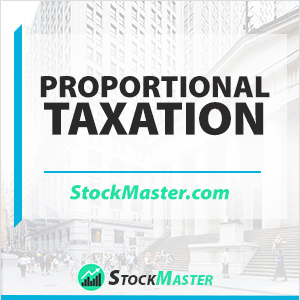What is a Proprietor? Definition: A proprietor is a person who creates and runs a business intending to make consistent profit from the business activities of that business. That is why such a business is usually described as a sole proprietorship. A sole proprietorship can thus be described as a single, unincorporated business operation that
Profit
What is Profit? Definition: Profit, also known as net income, is simply what is left behind when all expenses are deducted from earnings. It is also denoted as the financial benefit left behind whenever revenue exceeds expenses, costs, and taxes combined. In a business setting, profits can be channeled back into the business for expansion
Proportional Tax
What is a Proportional Tax? Definition: Proportional tax, also referred to as flat tax, is a tax system whereby the same percentage tax rate is levied across all income brackets. In this case, low, middle, and high-income taxpayers are often hit with the same tax rate. The tax system differs from progressive or marginal tax
Purchase Requisition
What is a Purchase Requisition? Definition: Purchase requisition is a form that departments in big organizations fill to indicate they wish to purchase some materials or merchandise. The requisition form notifies relevant authorities, more so purchasing departments, that some materials or merchandise are needed for the smooth running of a given department. Understanding Purchase Requisition
Production Budget
What is a Production Budget? Definition: Production budget is a budgetary plan that details the total number of products that will be manufactured over a given period along with the costs. The plan is derived from sales forecast as it is an estimate of the total units a production plant intends to produce. A production
Pro-rata Share
What Is Pro-rata share? Definition: Pro-rata, share is an accounting term used to denote sharing in equal proportions. Originating from a Latin term, the methodology is used to assign a proportionate amount on whatever is being shared, depending on ownership percentages or stakes. Pro-Rata Share Example Explained Likewise, the Pro-rata share can denote the equal
Principal Payment
What Is Principal Payment? Definition: Principal payment refers to the payment of a principal amount of a loan, in a bid to reduce the outstanding debt. In this case, payment is made to reduce the amount due on a loan rather than the accumulated interest. In most cases, individuals and corporations make a minimum payment
Product Costs
What Are Product Costs? Definition: Product cost is a term used to denote the total costs or expenses necessary to produce a good. The costs, in this case, can be direct labor costs, raw material costs as well as factory overhead costs. These costs are essential if a factory or a manufacturer is to turn
Vouching
What Is Vouching? Definition: Vouching is a technique that auditors use to establish the accuracy of transactions that an accountant recorded in a company’s books of account. Since the goal of auditing to verify that the information in the books of account is true, then vouching is simply the essence of the whole task. The
Unsystematic Risk
What is Unsystematic Risk? Definition: Unsystematic risk refers to the danger that investors face when they buy certain asset. This risk is specific to the asset that the investor buys hence sometimes called specific risk. A risk that is specific to a particular asset in your portfolio is avoidable through diversification. Constructing a portfolio where










